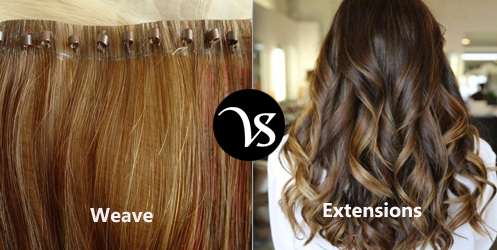 Weave:
Weave:
Weave is the way to add the length or volume to the hair. It is the expensive types of method. It may last to the weeks to the months. The artificial hairs are added by sewing looking it natural. The length is added to the hair without the use of chemicals or glues. The special shampoos and conditioner should be used.
Extensions:
Extension is the way to add the length of the hair either natural or artificial hair by using the clips, sealing, fusion, tracking, netting, etc. It is the most expensive and time consuming method. It can be done at home too. It helps the people with thin hair to get fuller head of hair. If it is properly maintained then it can last up to the year.
Differences:
| Basis | Weave | Extensions |
|---|---|---|
| Definition (www.oxforddictionaries.com) |
A hairstyle created by weaving pieces of real or artificial hair into a person’s existing hair, typically in order to increase its length or thickness | Lengths of artificial hair woven into a person’s own hair to create a very long hairstyle. |
| Synonyms | Texture, compose, interlace, twist, compose, wind, splice | Prolongation, appendage, elongation, broadening, growth, continuation |
| Antonyms | Deliver, demolish, debase, derange, dart, cleave | Reduction, contraction, briefness, decline, conciseness, compression |
| Types | Its types are:
|
Its types are:
|
| History | African American lady by the name of Christina Jenkins invented the hair weaving process in the nineteen fifties. She received a patent in 1951 for this process of hair weaving. Although people were wearing wigs and hair pieces for thousands of years, Christina came up with the weaving idea. | Hair extensions have already been around ever since Cleopatra’s era. It has been said that researchers have found ancient Egyptians carcasses wearing hair weaves in 3400 BC. |
| Word origin | The word weave was originated from Old English wefan, of Germanic origin, from an Indo-European root shared by Greek huphē ‘web’ and Sanskrit ūrṇavābhi ‘spider’, literally ‘wool-weaver’. The current noun sense dates from the late 19th century. | The word extension was originated from Late Middle English: from late Latin extensio(n-), from extendere ‘stretch out’. |
| Pronunciation |
|
|
| Advantages/Benefits | Its merits are:
|
Its advantages are:
|
| Disadvantages | Its disadvantages are:
|
Its disadvantages are:
|
| Example in Sentence |
|
|





